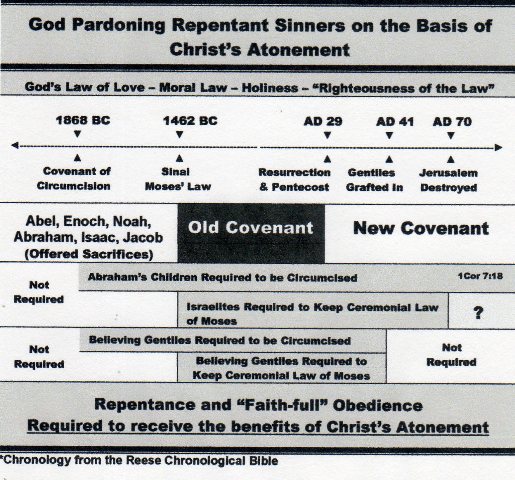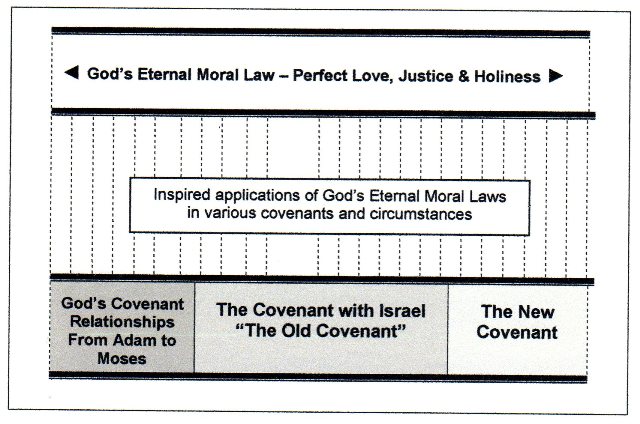
Did Jesus Correct Moses?
Old Covenant — New Covenant
Moses — Jesus
Law — Grace
What is the relationship?
I am amazed at the vast amount of misunderstanding concerning these relationships. Satan has worked hard to muddy the waters and obscure the light; and man’s lack of concern and diligence has only helped further Satan’s agenda. If you believe wrong, you live wrong; and in living and believing wrong you misrepresent Christ, and jeopardize your soul as well as the souls of all those you influence.
There is no debating the fact that the New Covenant was meant to be a step up to something higher and more spiritual than the Old; because the New Covenant reveals the true spiritual meaning of the Old Covenant. The Jews, according to the rabbinical writings, understood that when Messiah came He would usher in a new era. The prophets spoke of it, and the apostles confirmed it.
Deut 18:17 And the LORD said unto me, They have well spoken that which they have spoken. 18 I will raise them up a Prophet from among their brethren, like unto thee, and will put my words in his mouth; and he shall speak unto them all that I shall command him.
19 And it shall come to pass, that whosoever will not hearken unto my words which he shall speak in my name, I will require it of him.
Acts 2:16 But this is that which was spoken by the prophet Joel;
17 And it shall come to pass in the last days, saith God, I will pour out of my Spirit upon all flesh: and your sons and your daughters shall prophesy, and your young men shall see visions, and your old men shall dream dreams:
18 And on my servants and on my handmaidens I will pour out in those days of my Spirit; and they shall prophesy:
Acts 3:22 For Moses truly said unto the fathers, A prophet shall the Lord your God raise up unto you of your brethren, like unto me; him shall ye hear in all things whatsoever he shall say unto you.
23 And it shall come to pass, that every soul, which will not hear that prophet, shall be destroyed from among the people.
24 Yea, and all the prophets from Samuel and those that follow after, as many as have spoken, have likewise foretold of these days.
Acts 7:37 This is that Moses, which said unto the children of Israel, A prophet shall the Lord your God raise up unto you of your brethren, like unto me;him shall ye hear.
Many church groups build their doctrine on the belief that Jesus corrected the Law of Moses or did away with it altogether. What is the relationship of the New Covenant to the Old Covenant? Was anything preserved from the Old Covenant? Why do some still keep the Old Covenant feasts and dietary laws? Are Gentiles saved one way, while Jews are saved another? Are the Old Testament Scriptures even relevant? Should we even study them?
Some believe that people were justified by God different in the Old Covenant than they are in the New Covenant. You will hear them say, “We are not under the Law, but under Grace” — what does that mean? If a preacher sets up rules and standards of conduct for his church, they say, “He is preaching law and not grace”. Were the people in the Old Covenant saved by works without grace? Are we saved by grace without works?
Should the “Sermon On The Mount” be interpreted as “Jesus correcting Moses’ Law” or should it be interpreted as “Jesus correcting misconceptions concerning Moses Law?” Was divorce and remarriage allowed by Moses, but forbidden by Jesus? Were the people in the Old Covenant allowed to defend themselves and participate in government, but New Covenant saints are not? Do we have any obligations to God’s commandments in the Old Covenant? Is our meditation and memorization in Psalm 119 still relevant?
Ps. 119: 9 ¶ BETH. Wherewithal shall a young man cleanse his way? by taking heed thereto according to thy word.
10 ¶ With my whole heart have I sought thee: O let me not wander from thy commandments.
11 ¶ Thy word have I hid in mine heart, that I might not sin against thee.
12 ¶ Blessed art thou, O LORD: teach me thy statutes.
13 ¶ With my lips have I declared all the judgments of thy mouth.
14 I have rejoiced in the way of thy testimonies, as much as in all riches.
15 I will meditate in thy precepts, and have respect unto thy ways.
16 I will delight myself in thy statutes: I will not forget thy word.
Can we still whole heartedly sing Psalm 1:1-3?
Ps. 1:1 ¶ Blessed is the man that walketh not in the counsel of the ungodly, nor standeth in the way of sinners, nor sitteth in the seat of the scornful.
2 But his delight is in the law of the LORD; and in his law doth he meditate day and night.
3 And he shall be like a tree planted by the rivers of water, that bringeth forth his fruit in his season; his leaf also shall not wither; and whatsoever he doeth shall prosper.
Should we still be singing Psalm 19: 7-11?
Ps. 19:7 The law of the LORD is perfect, converting the soul: the testimony of the LORD is sure, making wise the simple.
8 The statutes of the LORD are right, rejoicing the heart: the commandment of the LORD is pure, enlightening the eyes.
9 The fear of the LORD is clean, enduring for ever: the judgments of the LORD are true and righteous altogether.
10 More to be desired are they than gold, yea, than much fine gold: sweeter also than honey and the honeycomb.
11 Moreover by them is thy servant warned: and in keeping of them there is great reward.
In attempting to answer this important and complex question, we need to first get a general view of the situation. Jesus was born under the jurisdiction of the Old Covenant, kept the Law perfectly, and became the first perfect man and first perfect Jew. He could, therefore, be the sin offering that God could lawfully accept to atone for man’s sins.
Galatians 4:4-5 But when the fulness of the time was come, God sent forth his Son, made of a woman, made under the law, to redeem them that were under the law, that we might receive the adoption of sons.
1 Peter 2:22 Who did no sin, neither was guile found in his mouth: (Luke 23:41; John 8:46; 2Cor. 5:21; Heb. 4:15)
1 John 3:4 Whosoever committeth sin transgresseth also the law: for sin is the transgression of the law.
Jesus never broke the Law in word or deed. He had to fulfill the Law perfectly to be the lawful spotless Lamb to make atonement for sins according to the Law. Had Jesus preached contrary to the Scriptures, it would have only proven Him to be a false prophet and a sinner.
Isa 8:20 To the law and to the testimony: if they speak not according to this word, it is because there is no light in them
The Jewish leaders would have been justified in rejecting Jesus had he been preaching contrary to the Word. The Jews never accused Jesus of teaching contrary to the Scriptures. His preaching never violated the Law; but purified the sons of Jacob (Mal. 3:3).
This remnant of true Israelites, purified from their false concepts and hard hearts, were called into a new covenant based on the atonement and priesthood of Christ, rather than the sacrifices and service of the Old Covenant. Christ established the church of these purified Israelites; and then grounded the Jewish believers in the Faith for twelve years after the Spirit was poured out at Pentecost. Then, after twelve years, He grafted in the Gentile believers; but did not subject them to the ceremonial laws or circumcision, as these were not necessary now for their justification in Christ. Prior to this, Gentiles were required to come under Moses’ Law and Circumcision to be Christians. Circumcision and the Law of Moses were still binding on Jewish believers at this point, even though they were in the New Covenant. The Gentile believers were subject to the moral aspects of God’s law; and were required to live holy lives without willful sin. The Christian Jews were still obligated to the Ceremonial Law and temple service; but had a new understanding of why they did what they did (Acts 21). They also understood that fulfilling the righteousness of the law from the heart was priority over the ceremonies and rituals.
In A.D. 70 God used the Romans to destroy Jerusalem, lay the Temple waste, and disperse the unbelieving Jews throughout the world as bondmen. The believers had followed Jesus’ warnings and fled Jerusalem previous to its destruction. This destruction ended the believing Jew’s obligations to the Temple, priesthood, sacrifices, i.e. every part of the Ceremonial Law that required Jerusalem and the Temple. It is debatable whether these Christian Jews were now released completely from circumcision and the ceremonial laws (Act 21:24-25; I Cor. 7:18); as not all of it is fulfilled — the fall feasts are prophetic of Christ’s second coming. Obviously God didn’t expect them to observe those things which were now impossible.
The New Covenant was built upon the foundation of the Old just like the Old Covenant was built upon the foundation of the covenants with Jacob, Isaac, Abraham, Noah, etc. So, as the covenant of circumcision through Abraham was continued under the newer Mosaic Covenant; the New Covenant, in being built on the foundation of the older covenants, continued many things and modified others. What were these changes, and where do we draw the lines?

The diagram shows what principles are for all time, and which ones are temporary. The Gospel: “the good news of God’s pardoning grace on the basis of Christ’s atonement” has been relevant since the fall of man, and is God’s only plan of salvation for repentant sinners. The transgression of God’s Moral Law is why men are sinners from beginning to end. Mankind being required to respond to God with repentance and a humble obedient faith in order to be saved by grace is valid from Genesis to Revelation. Other matters, however, have only been relevant for a certain time period as part of a covenant arrangement.
Don’t miss the fact that both Jews and Gentile converts were subject to circumcision and Moses’ Law in the New Covenant until Cornelius. New Gentile converts were released from this twelve years after Pentecost; but Jews were still under circumcision and ceremonial law in the New Covenant at least until the destruction of Jerusalem in AD 70.
Because of these glaring facts of history in God’s Word many need to rethink their theology. Were the apostles “legalists” before Cornelius? Did they preach salvation by works before Cornelius? Were they saved by faith? Was the Gospel the same before and after Cornelius? Was the Gospel the same to both Jews and Gentiles? These questions will be answered in the following pages if you pay close attention.
2
What is Moses’ Law?
The Law of Moses is the first five books of the Bible, called the Pentateuch: Genesis, Exodus, Leviticus, Numbers, and Deuteronomy. The Law of Moses was a covenant between God and Israel; and contained both moral laws, and also ceremonial laws. The entire Old Covenant scriptures were combined with Moses’ five books; and the whole was considered as the complete covenant and also referred to as “the Law”. Sometimes the word “law” is referring to the ceremonial aspects, and sometimes it is referring to the moral aspects; and this must be determined by the context in which it is used.
All the Old Covenant Scriptures are the inspired Word of God:
2 Peter 1:21 For the prophecy came not in old time by the will of man: but holy men of God spake as they were moved by the Holy Ghost.
2 Timothy 3:16 All scripture is given by inspiration of God, and is profitable for doctrine, for reproof, for correction, for instruction in righteousness: 17 That the man of God may be perfect, throughly furnished unto all good works.
You are not thoroughly furnished unto all good works when you leave out the Old Covenant.
If one wishes to see how God felt about His laws given through Moses, just read Deuteronomy chapter 4 & 5.
Deut 4:1 Now therefore hearken, O Israel, unto the statutes and unto the judgments, which I teach you, for to do them,
…2 Ye shall not add unto the word which I command you, neither shall ye diminish ought from it, that ye may keep the commandments of the LORD your God which I command you.
… 5 Behold, I have taught you statutes and judgments, even as the LORD my God commanded me, that ye should do so in the land whither ye go to possess it.
6 Keep therefore and do them; for this is your wisdom and your understanding in the sight of the nations, which shall hear all these statutes, and say, Surely this great nation is a wise and understanding people.
…8 And what nation is there so great, that hath statutes and judgments so righteous as all this law, which I set before you this day?
…5:29 O that there were such an heart in them, that they would fear me, and keep all my commandments always, that it might be well with them, and with their children for ever!
The Bible is a progressive revelation in many areas, but it never contradicts itself. Circumstances change, and covenant arrangements change; but God never changes. It is clear that some things have changed, but others are unchanging – what makes the difference? How do we determine what was specifically for the Old Covenant and doesn’t apply in the New?
Let’s start from the beginning. Genesis 1:1 says, “In the beginning God…” It is clear that God pre-dates the world; and that God’s nature, purpose, views, opinions, and standards are unchanging:
n Mal 3:6 For I am the LORD, I change not; therefore ye sons of Jacob are not consumed.
n James 1:17 Every good gift and every perfect gift is from above, and cometh down from the Father of lights, with whom is no variableness,neither shadow of turning.
The same can be said of Jesus Christ, as He is God; and when he was a man, he was God in the flesh.
n John 1:1 In the beginning was the Word, and the Word was with God, and the Word was God. 2 The same was in the beginning with God. 3 All things were made by him; and without him was not any thing made that was made.
n John 1:14 And the Word was made flesh, and dwelt among us, (and we beheld his glory, the glory as of the only begotten of the Father,) full of grace and truth.
n 1 Timothy 3:16 And without controversy great is the mystery of godliness: God was manifest in the flesh, justified in the Spirit, seen of angels, preached unto the Gentiles, believed on in the world, received up into glory.
n Heb 13:8 Jesus Christ the same yesterday, and to day, and for ever.
In eternity past God had the same nature, views, opinions, and purposes as He has today, and will have forever. God’s morality is unchanging, and God’s judgments will always be the same when the exact same circumstances exist. Give the same scenario, and God will always give the same judgment call. God lived by the Law of Love before He created the world, and God still lives by the Law of love. God’s Law is always the best thing to do under the circumstances — always.
This Law of universal benevolence is God’s very nature, and it is the Law of Heaven. The Bible says “God is Love” and that to obey his commandments is to act in His love:
1John 4:7 Beloved, let us love one another: for love is of God; and every one that loveth is born of God, and knoweth God. 8 He that loveth not knoweth not God; for God is love.
1John 5:2 By this we know that we love the children of God, when we love God, and keep his commandments. 3 For this is the love of God, that we keep his commandments: and his commandments are not grievous.
God is Love — perfect benevolence is the rule that God himself lives by. The Moral Law of God is simply the proper expression of the universal and grand principle of Love. God is the only one qualified to dictate what is and what is not the proper expression of benevolence. Therefore, because God is the creator, owner, and only qualified judge; He is also obligated to teach and enforce the law of benevolence on all moral beings. His moral precepts, statutes, commands, etc. found in the Bible, and more particularly in the Law of Moses, are God telling us to obey the Law of Love, which He applies to many aspects of life.
Jesus declared that the “law and the prophets” (meaning the whole Old Covenant) hung from this divine principle of love.
Matt. 22:34 But when the Pharisees had heard that he had put the Sadducees to silence, they were gathered together. 35 Then one of them, which was a lawyer, asked him a question, tempting him, and saying, 36 Master, which is the great commandment in the law? 37 Jesus said unto him, Thou shalt love the Lord thy God with all thy heart, and with all thy soul, and with all thy mind. 38 This is the first and great commandment. 39 And the second is like unto it, Thou shalt love thy neighbour as thyself. 40 On these two commandments hang all the law and the prophets.
Jesus didn’t say it would be this way “from now on”; but that it had always been this way. Jesus never said, “From this day forward these two commandments replace the Law and the Prophets” He said, “The law and the prophets have always and only, from the beginning, expressed these two great commandments”. Everything they said can be summed up in these two great commandments — which can be summed up in the word LOVE — God’s very nature of benevolence — LOVE in its proper definition and expression.
God’s Law in every respect is the proper application of Love — so if the circumstances are the same, the same expression of love is still appropriate. God’s nature of universal benevolence or unselfish love is the basis of all that He does or ever has done. God’s Moral Laws have always existed right along with God. The moral precepts of Moses’ Law are simply the inspired applications of God’s eternal moral standards.
As long as “Thou shalt love the Lord thy God with all thy heart, and with all thy soul, and with all thy mind” and, “Thou shalt love thy neighbour as thyself” are still relevant, then the whole moral law of God is still relevant, for it only expresses these two commands according to what God judges proper.
Is the “Golden Rule” still relevant?
Mt 7:12 Therefore all things whatsoever ye would that men should do to you, do ye even so to them: for this is the law and the prophets.
Do you live by the golden rule? If you really do in God’s definition, then you live by the Law and the prophets as well. If you truly live by God’s Law and prophets, then you really live by the golden rule. So, is God’s Law still relevant? If Jesus commanded the golden rule, which is the principle on which all the Law and the prophets are built, then Jesus is teaching and commanding the spirit and righteousness of God’s Law.
Is every word of the Scriptures important? Did Jesus believe the OT Scriptures were still valid?
Mt 4:1 Then was Jesus led up of the Spirit into the wilderness to be tempted of the devil.
2 And when he had fasted forty days and forty nights, he was afterward an hungred.
3 And when the tempter came to him, he said, If thou be the Son of God, command that these stones be made bread.
4 But he answered and said, It is written, Man shall not live by bread alone, but by every word that proceedeth out of the mouth of God.
When Studying the Scripture we must build from these clear and indubitable foundation stones. We cannot look at a passage of Scripture and say that God seems to have changed his mind about “right and wrong”; but we must first say, “God is immutable, and therefore we must interpret this passage in light of God’s unchanging standards of morality”. To interpret Scripture as to overthrow God’s immutability is to create heresy. Some will say, “But God changed His mind many times, like when He decided not to destroy Nineveh”. God warning a city, and then having mercy on them when they repent is a part of God’s unchanging ways. This is how God always operates (Jer 18). Jesus was definitely different in the manger than he was on the cross; but yet Jesus is the same yesterday, today, and forever (Heb. 13:8) — So what is the same? When He was in the manger, He was a baby; and when He was on the cross, He was a man; but His moral judgments, values, opinions, etc. as the Son of God are eternal and unchanging.
3
What is sin?
Sin is any violation of the moral laws of God and whatever covenant conditions we are under. Rebellion or intentional transgression is called willful or presumptuous sin. Unintentional or unknown transgression is called ignorant sin (Numbers 15 compare Hebrews 10:26-28)
James 4:17 Therefore to him that knoweth to do good, and doeth it not, to him it is sin.
Romans 1:18 For the wrath of God is revealed from heaven against all ungodliness and unrighteousness of men, who hold the truth in unrighteousness;
In Romans 1:18 we find that God’s wrath is revealed from heaven against all ungodliness and unrighteousness of men who hold the truth, but continue in unrighteousness. The word for ungodliness means “improper worship” — Not loving God with all our heart and thus not fulfilling the first and greatest commandment. The word unrighteousness means “injustice”; and refers to the second commandment being broken — not loving your neighbor as yourself. God’s wrath will be poured out in judgment based on God’s Moral Law being broken by people “who knew better” — they sinned against the light and knowledge of God’s moral ways that they had. Listen to Romans 2:1-16:
Romans 2:1 Therefore thou art inexcusable, O man, whosoever thou art that judgest: for wherein thou judgest another, thou condemnest thyself; for thou that judgest doest the same things.
The apostle had just concluded in the last chapter that man, “…knowing the judgment of God, that they which commit such things are worthy of death, not only do the same, but have pleasure in them that do them.” When men make judgments on other’s actions it reveals their understanding of right and wrong; and their judging tells God they understand something about His moral laws. This only condemns them when they are not striving to obey God’s moral laws themselves, nor separating from others who don’t.
Romans 2:2 But we are sure that the judgment of God is according to truth against them which commit such things.
3 And thinkest thou this, O man, that judgest them which do such things, and doest the same, that thou shalt escape the judgment of God?
4 Or despisest thou the riches of his goodness and forbearance and longsuffering; not knowing that the goodness of God leadeth thee to repentance?
5 But after thy hardness and impenitent heart treasurest up unto thyself wrath against the day of wrath and revelation of the righteous judgment of God;
6 Who will render to every man according to his deeds:
7 To them who by patient continuance in well doing seek for glory and honour and immortality, eternal life:
n This is the salvation of the believers
8 But unto them that are contentious, and do not obey the truth, but obey unrighteousness,
n This is the unbeliever, and they will get…
…indignation and wrath,
9 Tribulation and anguish, upon every soul of man that doeth evil, of the Jew first, and also of the Gentile;
10 But glory, honour, and peace, to every man that worketh good, to the Jew first, and also to the Gentile:
11 For there is no respect of persons with God.
12 For as many as have sinned without law shall also perish without law: and as many as have sinned in the law shall be judged by the law;
13 (For not the hearers of the law are just before God, but the doers of the law shall be justified.
14 For when the Gentiles, which have not the law, do by nature the things contained in the law, these, having not the law, are a law unto themselves:
15 Which shew the work of the law written in their hearts, their conscience also bearing witness, and their thoughts the mean while accusing or else excusing one another;)
16 In the day when God shall judge the secrets of men by Jesus Christ according to my gospel.
Every man has a conscience based on God’s moral law. Even in his fallen state his moral conscience is not totally destroyed, and he will be judged for every violation of knowledge he possessed or could have possessed.
Romans 1:18 For the wrath of God is revealed from heaven against all ungodliness and unrighteousness of men, who hold the truth in unrighteousness;
19 Because that which may be known of God is manifest in them; for God hath shewed it unto them.
20 For the invisible things of him from the creation of the world are clearly seen, being understood by the things that are made, even his eternal power and Godhead; so that they are without excuse:…
Vs. 28 And even as they did not like to retain God in their knowledge, God gave them over to a reprobate mind, to do those things which are not convenient;
Adam Clarke: They did not like to retain God] “It would, perhaps, be more literal to translate ouk edokimasan, THEY DID NOT SEARCH to retain God in their knowledge. They did not examine the evidences before them (Ro 1:19,20) of his being and attributes; therefore God gave them over to a REPROBATE mind, eiv adokimon noun, to an UNSEARCHING or undiscerning mind; for it is the same word in both places. They did not reflect on the proofs they had of the Divine nature, and God abandoned them to the operations of a mind incapable of reflection. How men of such powers and learning, as many of the Greek and Roman philosophers and poets really were, could reason so inconsecutively concerning things moral and Divine is truly astonishing. But here we see the hand of a just and avenging God; they abused their powers, and God deprived them of the right use of these powers.”
To be “willingly ignorant” (2 Pet.3:5) is no protection against just judgment. If you fail to investigate and justly consider all the evidence, then you are deliberately ignorant, and thus guilty of rejecting truth.
God’s moral law will be the basis for all judgment on that great Day of Judgment. God’s judgment is based on your knowledge, your ability, your opportunities,and your potential, i.e. what you did with what you had. The “work of the law written on their hearts” (Rom. 2:15) is referring to the striving of God’s Spirit with man, just like it says He did before Noah’s flood (Gen. 6:3). It’s not the same as God writing his law in the hearts of New Covenant believers (Heb. 8:10), though it is similar. New Covenant believers have the indwelling Holy Spirit teaching them (John 14:17-26); but other men simply have God’s Spirit convicting them from without (John 16:8).
Romans 14:23 …for whatsoever is not of faith is sin.
Faith is doing what you believe pleases God. Faith is believing God and properly relating to Him as Lord of the universe. When you knowingly violate this, you are bringing judgment upon yourself.
Sin is often spoken of long before Sinai, because sin is the trespass of God’s Eternal Moral Law, which pre-dates and post-dates Moses’ Law; but is expressed to a large degree in Moses’ Law.
I John 3:4 Whosoever committeth sin transgresseth also the law: for sin is the transgression of the law. 5 And ye know that he was manifested to take away our sins (transgressions of the Law); and in him is no sin (transgression of the Law).
This was written around A.D. 95. Sin has to do with the violation of God’s Law from whatever source you have received it — either from Moses, a prophet, John the Baptist, the Lord Jesus, an apostle, or your God given conscience. The Scriptures which manifest God’s moral judgments and opinions are to us a law, and to disobey the Scriptural revelation of God’s will and way is SIN.
Since “iniquity” is from “anomia” “without law” or “lawless”, we need to find out what laws we are to obey — because Jesus hates “anomia”. See this word in the following verses:
Mt 7: 21 Not every one that saith unto me, Lord, Lord, shall enter into the kingdom of heaven; but he that doeth the will of my Father which is in heaven.
22 Many will say to me in that day, Lord, Lord, have we not prophesied in thy name? and in thy name have cast out devils? and in thy name done many wonderful works?
23 And then will I profess unto them, I never knew you: depart from me, ye that work iniquity (lawlessness).
Mt 13:41 The Son of man shall send forth his angels, and they shall gather out of his kingdom all things that offend, and them which do iniquity (lawlessness);
Tit 2:14 Who gave himself for us, that he might redeem us from all iniquity (lawlessness), and purify unto himself a peculiar people, zealous of good works.
Heb 1:9 Thou [Jesus] hast loved righteousness, and hated iniquity (lawlessness);
If the doctrine you’ve been taught, tells you that you don’t have to obey the Law of God, and thus leads you to a “law-less” faith, then it is not of Christ. As long as sin is punished by God, the moral laws of God are still obligatory. Jesus is a King with a Kingdom, and His Kingdom has a Law — it is the eternal moral Law of God. If you are to live in His Kingdom, you must love and obey God’s Law. The Moral Laws given through Moses are inspired applications of the eternal Moral Law of God. They are still the “will of the Father” that you must obey, or you will be found “lawless” and cast out.
4
What about the Ceremonial Law?
There is a definite difference between moral laws and ceremonial laws. The Bible makes this distinction very plain. The Moral Law is eternal and the Ceremonial Law is temporal and specifically related to the covenant in which it was given. The ceremonies God gave were object lessons about God’s plan of salvation. They taught that God’s relationship with man required more than submission to the moral laws; but that atonement for man’s sin was necessary also. The Moral Law never becomes irrelevant; but the Ceremonial Law is irrelevant once it is fulfilled or a new covenant replaces it with other rituals or practices. The Moral Law is God’s view of morality for eternity; but the ceremonial laws given to man (including Moses’ Law) are types and shadows awaiting the reality that they illustrate. Most ceremonial laws of the Old Testament found their fulfillment in the life, death, resurrection, and priestly ministry of Jesus Christ. I say “most” because the fall feasts are types of Christ’s second coming, and have not been fulfilled. The ceremonial sacrifices God gave were man’s way of believing in Christ’s atonement before Christ even came. The gospel was preached through the animal sacrifices, and as men reverently observed these, they were believing in God’s salvation by grace.
It is important to understand that God’s relationship with fallen mankind has always been in the form of covenants. These covenants had two basic parts:
n First, man’s willingness to live by God’s moral standards; and
n Second, God gave some sort of rituals or ceremonies to teach about God’s conditional salvation through blood atonement.
God could not allow man to think that present submission to God’s moral standards was sufficient to maintain a relationship with God, because man had fallen, and could not redeem himself or atone for his own sin. God started teaching man immediately after the fall that two things were necessary for man to have a covenant relationship with God:
1. Repentance and submission to God’s moral laws, and …
2. A blood atonement.
God taught this principle through what we call ceremonial law or ritual law. This also predates Moses. Moses’ Law was a covenant arrangement with the nation of Israel for a certain time period until Christ came. God had been relating with man on similar principles from the time Adam and Eve fell. Moses’ Law incorporated and codified these older covenants.
We find that Cain and Abel knew about ritual obligations, and it was Cain’s trespass against this arrangement that caused his offering to be rejected. God had taught them to bring an animal sacrifice for blood atonement. God tells Cain that if he would do well, he would be accepted, but if not, a sin offering was at the door, and he could avail himself of it.
n Gen. 4:7 If thou doest well, shalt thou not be accepted? and if thou doest not well, sin [a sin offering] lieth at the door.
Noah was instructed to take more clean animals on the Ark than unclean animals. This was partly due to animal sacrifices which we find them offering as soon as they were off the Ark. Noah knew the difference between clean and unclean animals, and also about animal sacrifices upon altars.
n Gen. 8:20 And Noah builded an altar unto the LORD; and took of every clean beast, and of every clean fowl, and offered burnt offerings on the altar.
We find Abraham walking up to Mount Moriah where God told him to offer Isaac on the altar as a type of Christ’s atonement. As he walked Isaac asked a very revealing question:
n Genesis 22:7 And Isaac spake unto Abraham his father, and said, My father: and he said, Here am I, my son. And he said, Behold the fire and the wood: but where is the lamb for a burnt offering?
Isaac knew all about this principle long before Moses’ Law. Abraham had told his servant that they would go yonder to worship and then return. Isaac knew what that meant. We find in Genesis 26 God declaring to Isaac the reason why Abraham was blessed:
n Gen. 26:5 Because that Abraham obeyed my voice, and kept my charge, my commandments, my statutes, and my laws.
Hear what God commanded Abraham to do along with these sacrifices which pictures God’s plan for atonement in Christ:
n Gen 17:1 And when Abram was ninety years old and nine, the LORD appeared to Abram, and said unto him, I am the Almighty God; walk before me, and be thou perfect.
As Abraham obeyed the moral precepts God gave him and worshipped through blood sacrifices, his relationship with God was maintained. His faith was seen in his faith-full-ness.
Even the covenant of circumcision was a covenant based on Abraham submitting to God’s Moral Law, and having the sign and symbol of circumcision as a ceremony or ritual observance picturing a regenerated heart.
Col 2:11 In whom also ye are circumcised with the circumcision made without hands, in putting off the body of the sins of the flesh by the circumcision of Christ:
Circumcision symbolized the faithful obedience of Abraham. It had to do with the principle of crucifying the flesh and walking in the Spirit. Those with the ceremonial letter of the law fulfilled in their flesh; but without the spiritual meaning fulfilled in their heart were missing the point.
Romans 2:23 Thou that makest thy boast of the law, through breaking the law dishonourest thou God? 24 For the name of God is blasphemed among the Gentiles through you, as it is written. 25 For circumcision verily profiteth, if thou keep the law: but if thou be a breaker of the law, thy circumcision is made uncircumcision. 26 Therefore if the uncircumcision keep the righteousness of the law, shall not his uncircumcision be counted for circumcision? 27 And shall not uncircumcision which is by nature, if it fulfil the law, judge thee, who by the letter and circumcision dost transgress the law? 28 For he is not a Jew, which is one outwardly; neither is that circumcision, which is outward in the flesh: 29 But he is a Jew, which is one inwardly; and circumcision is that of the heart, in the spirit, and not in the letter; whose praise is not of men, but of God.
These verses prove that there is a definite separation between moral and ceremonial laws as Paul argues that one who is obeying the moral laws (righteousness of the law); but is an uncircumcised Gentile (not fulfilling the ceremonial laws) is still acceptable to God and has the true essence of being a Jew within though not without. The Ceremonial Law was to be done away, but the Moral Law (its counterpart) was never done away. The circumcision in the flesh became unnecessary, but the circumcision of the heart would always be necessary.
Rom 4:9 Cometh this blessedness then upon the circumcision only, or upon the uncircumcision also? for we say that faith was reckoned to Abraham for righteousness. 10 How was it then reckoned? when he was in circumcision, or in uncircumcision? Not in circumcision, but in uncircumcision. 11 And he received the sign of circumcision, a seal of the righteousness of the faith which he had yet being uncircumcised: that he might be the father of all them that believe, though they be not circumcised; that righteousness might be imputed unto them also: 12 And the father of circumcision to them who are not of the circumcision only, but who also walk in the steps of that faith of our father Abraham, which he had being yet uncircumcised. 13 For the promise, that he should be the heir of the world, was not to Abraham, or to his seed, through the law, (the ceremonial covenant of types and shadows) but through the righteousness of faith. (The real entity — obedience to God’s moral laws from the heart)
This whole argument proves the separation between the moral and ceremonial laws and shows that salvation by grace, i.e. God imputing our living obeying faith to us as perfect righteousness and thus cleansing our record of sin, is a blessing bestowed not only on the “circumcision” (the Jews obeying the ceremonial law); but also on the “uncircumcision” (Gentile believers who don’t obey the ceremonial law). This blessing comes to those who have the faith of Abraham which obeyed God’s moral law. Whether we are Jews under the obligations of the ceremonial laws or Gentile converts who do not obey the ceremonial laws, we ALL must have the faith that obeys the moral laws of God!
5
The Old Covenant
The covenant made with Israel through Moses was:
1. Man’s commitment to God’s moral laws — inspired applications of the Moral Law of God applied to many different circumstances.
2. Ceremonies to teach that sin was a real problem that must be dealt with by a blood atonement or God could not have a relationship with man.
If you do a study about the Tabernacle and how it pictures Christ and New Covenant realities, you will be amazed at God’s design. The earthly rituals, which are only types and shadows, are the parts that lose relevance in Christ — He is the end (goal and aim) of the [ceremonial] law for righteousness (justification) to every one that believeth (Romans 10:4).
The Ceremonial Law, Levitical Priesthood, Tabernacle, etc; were earthly temporal patterns of the true and eternal realities in heaven — which will never lose their relevance.
Heb 8:1 Now of the things which we have spoken this is the sum: We have such an high priest, who is set on the right hand of the throne of the Majesty in the heavens;
2 A minister of the sanctuary, and of the true tabernacle, which the Lord pitched, and not man.
3 For every high priest is ordained to offer gifts and sacrifices: wherefore it is of necessity that this man have somewhat also to offer.
4 For if he were on earth, he should not be a priest, seeing that there are priests that offer gifts according to the law:
5 Who serve unto the example and shadow of heavenly things, as Moses was admonished of God when he was about to make the tabernacle: for,See, saith he, that thou make all things according to the pattern shewed to thee in the mount.
Heb. 9:8 The Holy Ghost this signifying, that the way into the holiest of all was not yet made manifest, while as the first tabernacle was yet standing:
9 Which was a figure for the time then present, in which were offered both gifts and sacrifices, that could not make him that did the service perfect, as pertaining to the conscience;
10 Which stood only in meats and drinks, and divers washings, and carnal ordinances, imposed on them until the time of reformation.
11 But Christ being come an high priest of good things to come, by a greater and more perfect tabernacle, not made with hands, that is to say, not of this building;
12 Neither by the blood of goats and calves, but by his own blood he entered in once into the holy place, having obtained eternal redemption for us.
…22 And almost all things are by the law purged with blood; and without shedding of blood is no remission.
23 It was therefore necessary that the patterns of things in the heavens should be purified with these; but the heavenly things themselves with better sacrifices than these.
24 For Christ is not entered into the holy places made with hands, which are the figures of the true; but into heaven itself, now to appear in the presence of God for us:
Heb. 10:1 For the law having a shadow of good things to come, and not the very image of the things, can never with those sacrifices which they offered year by year continually make the comers thereunto perfect.
It is very clear from these Scriptures that the Ceremonial Law, which included the service of the tabernacle/temple and the priesthood, was only temporary and is done away by Christ’s superior priesthood in the New Covenant. It is also very clear from the following verses in the same book of the Bible that some part of the Law of God is carried over and has become the basis of the New Covenant. Since we know it wasn’t the Ceremonial Law, then we can know it is the Moral Law. We know it wasn’t animal sacrifices and ceremonial washings that were written on believer’s hearts, but it was the moral precepts of God’s own holiness which were written on their hearts.
Heb. 8:10 For this is the covenant that I will make with the house of Israel after those days, saith the Lord; I will put my laws into their mind, and write them in their hearts: (preserved) and I will be to them a God, and they shall be to me a people:
11 And they shall not teach every man his neighbour, and every man his brother, saying, Know the Lord: for all shall know me, from the least to the greatest.
12 For I will be merciful to their unrighteousness, and their sins and their iniquities will I remember no more.
13 In that he saith, A new covenant, he hath made the first old. Now that which decayeth and waxeth old is ready to vanish away. (not preserved)
Heb. 10:8 Above when he said, Sacrifice and offering and burnt offerings and offering for sin thou wouldest not, neither hadst pleasure therein; which are offered by the law;
9 Then said he, Lo, I come to do thy will, O God. He taketh away the first, that he may establish the second.
Heb. 10:16 This is the covenant that I will make with them after those days, saith the Lord, I will put my laws into their hearts, and in their minds will I write them; (preserved)
17 And their sins and iniquities will I remember no more.
18 Now where remission of these is, there is no more offering for sin. (done away)
We can see that God’s eternal moral laws are written in our hearts, but the ceremonial laws of the covenant that pictured Christ’s atoning and priestly work are done away. God preserved His moral statutes and judgments: took them out of the Old Covenant setting, and made them the basis of the New Covenant.
6
The Priority of Moral over Ceremonial Law
God’s separation of the moral precepts from the ceremonial practices shows that without the Moral Law in place, the Ceremonial is without virtue — it only has value as it illustrates, teaches, and is founded upon the Moral Law. If you read carefully you will see the distinction between ceremonial laws that only illustrate truth and moral laws that are eternal truth. The Shadow Vs. The Substance.
1Sam. 15:22 And Samuel said, Hath the LORD as great delight in burnt offerings and sacrifices, as in obeying the voice of the LORD? Behold, toobey is better than sacrifice, and to hearken than the fat of rams.
Prov. 21:3 To do justice and judgment is more acceptable to the LORD than sacrifice.
Is. 1:10 ¶ Hear the word of the LORD, ye rulers of Sodom; give ear unto the law of our God, ye people of Gomorrah. 11 To what purpose is the multitude of your sacrifices unto me? saith the LORD: I am full of the burnt offerings of rams, and the fat of fed beasts; and I delight not in the blood of bullocks, or of lambs, or of he goats. 12 When ye come to appear before me, who hath required this at your hand, to tread my courts? 13 Bring no more vain oblations; incense is an abomination unto me; the new moons and sabbaths, the calling of assemblies, I cannot away with; it is iniquity, even the solemn meeting. 14 Your new moons and your appointed feasts my soul hateth: they are a trouble unto me; I am weary to bear them. 15 And when ye spread forth your hands, I will hide mine eyes from you: yea, when ye make many prayers, I will not hear: your hands are full of blood. 16 ¶ Wash you, make you clean; put away the evil of your doings from before mine eyes; cease to do evil; 17 Learn to do well; seek judgment, relieve the oppressed, judge the fatherless, plead for the widow.
Hosea 6:6 For I desired mercy, and not sacrifice; and the knowledge of God more than burnt offerings.
Jer. 7:21 ¶ Thus saith the LORD of hosts, the God of Israel; Put your burnt offerings unto your sacrifices, and eat flesh. 22 For I spake not unto your fathers, nor commanded them in the day that I brought them out of the land of Egypt, concerning burnt offerings or sacrifices: 23 But this thing commanded I them, saying, Obey my voice, and I will be your God, and ye shall be my people: and walk ye in all the ways that I have commanded you, that it may be well unto you.
Micah 6:6 ¶ Wherewith shall I come before the LORD, and bow myself before the high God? shall I come before him with burnt offerings, with calves of a year old? 7 Will the LORD be pleased with thousands of rams, or with ten thousands of rivers of oil? shall I give my firstborn for my transgression, the fruit of my body for the sin of my soul? 8 He hath shewed thee, O man, what is good; and what doth the LORD require of thee, but to do justly, and to love mercy, and to walk humbly with thy God?
Mt. 9:12 But when Jesus heard that, he said unto them, They that be whole need not a physician, but they that are sick. 13 But go ye and learn what that meaneth, I will have mercy, and not sacrifice: for I am not come to call the righteous, but sinners to repentance.
Mt. 15:11 Not that which goeth into the mouth defileth a man; but that which cometh out of the mouth, this defileth a man.
Mark 12:32 And the scribe said unto him, Well, Master, thou hast said the truth: for there is one God; and there is none other but he: 33 And to love him with all the heart, and with all the understanding, and with all the soul, and with all the strength, and to love his neighbour as himself, is more than all whole burnt offerings and sacrifices. 34 And when Jesus saw that he answered discreetly, he said unto him, Thou art not far from the kingdom of God.
Even in the Old Covenant, God taught them that circumcision was only a symbol and that He desired the circumcision of the heart and not just of the flesh.
De 10:16 Circumcise therefore the foreskin of your heart, and be no more stiffnecked.
De 30:6 And the LORD thy God will circumcise thine heart, and the heart of thy seed, to love the LORD thy God with all thine heart, and with all thy soul, that thou mayest live.
Jer 4:4 Circumcise yourselves to the LORD, and take away the foreskins of your heart, ye men of Judah and inhabitants of Jerusalem: lest my fury come forth like fire, and burn that none can quench it, because of the evil of your doings.
Rom 2:25 For circumcision verily profiteth, if thou keep the law: but if thou be a breaker of the law, thy circumcision is made uncircumcision. 26 Therefore if the uncircumcision keep the righteousness of the law, shall not his uncircumcision be counted for circumcision? 27 And shall not uncircumcision which is by nature, if it fulfil the law, judge thee, who by the letter and circumcision dost transgress the law? 28 For he is not a Jew, which is one outwardly; neither is that circumcision, which is outward in the flesh: 29 But he is a Jew, which is one inwardly; and circumcision is that of the heart, in the spirit, and not in the letter; whose praise is not of men, but of God.
Jesus’ teaching about the “Ox in the ditch on the Sabbath”, “healing on the Sabbath”, and all the controversy Jesus had concerning the Sabbath, was dealing with the principle that the Moral Law always held precedence over the ceremonial laws; and that ceremonial laws lost their virtue unless they were founded upon God’s eternal moral laws.
Heb.10:11 And every priest standeth daily ministering and offering oftentimes the same sacrifices, which can never take away sins:
12 But this man, after he had offered one sacrifice for sins for ever, sat down on the right hand of God;
Are “Sins” the same in verse 11 as in verse 12? Yes, and that means the Moral Law is still relevant. The only thing that has changed is God’s covenant relationship in how we deal with sin now. We have a new priesthood, a sacrifice with eternal merit, a heavenly priest ministering in a heavenly tabernacle in the presence of God, and we access this through the prayer of faith.
Heb. 10:16 This is the covenant that I will make with them after those days, saith the Lord, I will put my laws into their hearts, and in their minds will I write them;
17 And their sins and iniquities will I remember no more.
18 Now where remission of these is, there is no more offering for sin.
Sin is STILL Sin; but now that Jesus has made the atonement, there is no more offering — The OLD Covenant sacrifices are done away! But the moral laws of God are still to be obeyed, or we will not be eligible for Jesus’ atonement for us. Jesus’ blood will never cleanse sins that are not repented of; nor will He intercede for an unfaithful and rebellious person.
Heb. 10:26 For if we [Christians] sin wilfully after that we have received the knowledge of the truth [The Gospel], there remaineth no more sacrifice for sins,
This means that if a Christian rebels against God’s Word, and thereby stops walking in the Light, they forfeit the benefits of Christ’s atonement and priesthood on their behalf; and there is no other sacrifice or atonement that will avail for them. Going back to Judaism is worthless because those sacrifices were only shadows of the real one made by Jesus, and can never take away sin. Notice that SIN is still SIN, and God’s Moral Law, as the basis of the New Covenant, is still in force.
Heb. 10:38 Now the just shall live by faith: but if any man draw back, my soul shall have no pleasure in him.
Is this only a New Covenant concept? No, Paul is quoting Hab. 2:4 – salvation in the OT under the Law.
Hab. 2:4 Behold, his soul which is lifted up is not upright in him: but the just shall live by his faith.
Adam Clarke: It is contended by some able critics that the words of the original text should be pointed thus: ‘o de dikaiov ek pistewv, zhsetai. The just by faith, shall live; that is, he alone that is justified by faith shall be saved:
The one God calls “just” is “justified” before God due to his faith, and he shall “live” or “be saved” on this account. This principle is valid from Genesis to Revelation. It is the principle of salvation by grace through faith. Believing and obeying God (faith) is the best we can offer God, and it reverses the unbelief/disobedience of the fall as far as our part of reconciliation is concerned. The principle of faith imputed to us for righteousness (justification) is the only form of salvation offered by God to man. Our living by the obedience of faith (Romans 16:26) is what makes us eligible for the benefits of Christ’s atonement and priesthood.
In Heb. 12:18-29 it is clear that sin against the Moral Law has not changed; but the ceremonial arrangement for dealing with sin and rendering service to God has changed.
Heb 7:12 For the priesthood being changed, there is made of necessity a change also of the law.
What part of the law changed? The ceremonial part that dealt with priesthood, sacrifices, temple service, etc. is what changed.
7
The Middle Wall of Partition
In Ephesians and Colossians we find that the ceremonial laws stood as a partition that kept the Jewish people a distinct and separate people until Christ could be born; but now that Christ has come and opened the kingdom doors to also receive non-Jews; that middle wall of partition, the Ceremonial Law that foreshadowed Christ, is done away.
Ephesians 2:11 ¶ Wherefore remember, that ye being in time past Gentiles in the flesh, who are called Uncircumcision by that which is called the Circumcision in the flesh made by hands; 12 That at that time ye were without Christ, being aliens from the commonwealth of Israel, and strangers from the covenants of promise, having no hope, and without God in the world:
13 But now in Christ Jesus ye who sometimes were far off are made nigh by the blood of Christ.
14 ¶ For he is our peace, who hath made both one, and hath broken down the middle wall of partition between us;
15 Having abolished in his flesh the enmity, even the law of commandments contained in ordinances; for to make in himself of twain one new man, so making peace;
16 And that he might reconcile both unto God in one body by the cross, having slain the enmity thereby:
17 And came and preached peace to you which were afar off, and to them that were nigh.
18 For through him we both have access by one Spirit unto the Father.
19 Now therefore ye are no more strangers and foreigners, but fellowcitizens with the saints, and of the household of God;
20 And are built upon the foundation of the apostles and prophets, Jesus Christ himself being the chief corner stone;
21 In whom all the building fitly framed together groweth unto an holy temple in the Lord:
22 In whom ye also are builded together for an habitation of God through the Spirit.
The “Law of commandments contained in ordinances” is speaking of the ceremonial laws in the Old Covenant. It is obviously not speaking of God’s holiness revealed in His moral laws. Adultery, lying, coveting, etc. are still sin, and Jesus didn’t die so we are free to be unholy. God’s Moral Law is not the separation or “enmity” between Jew and Gentile that needed to be abolished in order to reconcile both together in one body in Christ.
Adam Clarke: Contained in, or rather concerning, ordinances; which law was made merely for the purpose of keeping the Jews a distinct people, and pointing out the Son of God till he should come. When, therefore, the end of its institution was answered, it was no longer necessary; and Christ by his death abolished it.
Instead of this separation, Jesus has made one NEW man from the two separate entities: believing Jew and believing Gentile. The New man is bound by the moral laws of God, as he is now in the household of God, and God hasn’t changed. We are now fellowcitizens with the what? The saints — holy people.
What determines holy? Has God’s holiness changed? Pay attention to where these verses are found that say, “Be ye holy for I am holy”:
n Le 11:44 For I am the LORD your God: ye shall therefore sanctify yourselves, and ye shall be holy; for I am holy:
n Le 11:45 For I am the LORD that bringeth you up out of the land of Egypt, to be your God: ye shall therefore be holy, for I am holy.
n Le 19:2 Speak unto all the congregation of the children of Israel, and say unto them, Ye shall be holy: for I the LORD your God am holy.
n Le 20:7 Sanctify yourselves therefore, and be ye holy: for I am the LORD your God.
n Le 20:26 And ye shall be holy unto me: for I the LORD am holy, and have severed you from other people, that ye should be mine.
n 1 Pe 1: 14 As obedient children, not fashioning yourselves according to the former lusts in your ignorance: 15 But as he which hath called you is holy, so be ye holy in all manner of conversation; 16 Because it is written, Be ye holy; for I am holy. 17 And if ye call on the Father, who without respect of persons judgeth according to every man’s work, pass the time of your sojourning here in fear:
Is God’s holiness the same? Holiness means “set apart to God”, and we must still be set apart to the same God, though under a different Covenant. The God of holiness has not changed. God’s idea of holiness has not changed in regard to moral precepts. Yes, disobedience to ceremonial law would have been sinful and unholy while it was still in force; but we have shown that these ceremonial laws were only for a certain time and purpose under a specific covenant that was meant to foreshadow Christ’s atonement and present priesthood. When they ceased to be relevant, they were no longer in force. Paul says plainly that circumcision was in and of itself “nothing”, and only had moral relevance when it was “keeping the commandment of God”.
1Cor. 7:19 Circumcision is nothing, and uncircumcision is nothing, but the keeping of the commandments of God.
The Law of Love never loses relevance like this. Bearing false witness, dishonoring parents, etc. are not just sins because God has forbidden them under this covenant; but are sins by their very nature. Circumcision is not this way. Jesus came to enforce and vindicate God’s ways. He cleared the misconceptions about God’s moral precepts given through Moses. The moral precepts themselves can never be changed. Only the ceremonial covenant rituals can be changed with the making of a new covenant.
Col 2:13 And you, being dead in your sins and the uncircumcision of your flesh, hath he quickened together with him, having forgiven you all trespasses;
14 Blotting out the handwriting of ordinances that was against us, which was contrary to us, and took it out of the way, nailing it to his cross;
15 And having spoiled principalities and powers, he made a shew of them openly, triumphing over them in it.
16 Let no man therefore judge you in meat, or in drink, or in respect of an holyday, or of the new moon, or of the sabbath days:
17 Which are a shadow of things to come; but the body is of Christ.
Ephesians and Colossians were written around the same time, and are “sister” epistles with much the same content. Here we are speaking of the same thing as what we previously read in Ephesians. It is clear that what is done away is not God’s holiness and moral statutes; but meat, drink, respect of holy days, new moon, circumcision, and Sabbath day observances — ceremonial laws — conditions of a covenant relationship. Paul tells us these things are simply a “shadow”, but the body is of Christ — He is the reality — the fulfillment of the types.
Gal. 5:6 For in Jesus Christ neither circumcision availeth any thing, nor uncircumcision; but faith which worketh by love.
Faith is only virtuous as it establishes the Moral Law of God (law of love); and produces a new creature fulfilling the righteousness of His eternal laws. “Circumcision” in this context refers to the whole Ceremonial Law/Judaism.
Gal. 6:15 For in Christ Jesus neither circumcision availeth any thing, nor uncircumcision, but a new creature.
This “new creature” is supposed to have the mind of Christ, which is the Moral Law of God written on the heart. Gal. 5:24 and 25 tell us about this new creature:
“24 And they that are Christ’s have crucified the flesh with the affections and lusts.
25 If we live in the Spirit, let us also walk in the Spirit.”
Rom. 8:4 That the righteousness of the law might be fulfilled in us, who walk not after the flesh, but after the Spirit.
Rom. 3:31 Do we then make void the law through faith? God forbid: yea, we establish the law.
How does faith establish the law? The Ceremonial Law taught us about Christ’s atonement, and when we believe in Him, we are establishing the truth of what the law foreshadowed. God’s eternal Moral Law is established by those who believe in him and take his prescription for living — holiness — the law of love. Salvation by faith also establishes the righteousness of the Law by confessing our guilt and just condemnation for not keeping the Law perfectly; by confessing we need a Savior to redeem us; and thereby confessing, “God was right, we were wrong, and our humble submission now is reasonable service.”
Rom 8:3 For what the law could not do, in that it was weak through the flesh, God sending his own Son in the likeness of sinful flesh, and for sin, condemned sin in the flesh:
4 That the righteousness of the law might be fulfilled in us, who walk not after the flesh, but after the Spirit.
5 For they that are after the flesh do mind the things of the flesh; but they that are after the Spirit the things of the Spirit.
6 For to be carnally minded is death; but to be spiritually minded is life and peace.
7 Because the carnal mind is enmity against God: for it is not subject to the law of God, neither indeed can be.
8 So then they that are in the flesh cannot please God.
9 But ye are not in the flesh, but in the Spirit, if so be that the Spirit of God dwell in you. Now if any man have not the Spirit of Christ, he is none of his.
Being Christ’s and walking in His Spirit brings us in line with God’s holiness and we then fulfill the moral laws of God. If you are not subject to the law of God, then you are not walking in the Spirit, and you are not Christ’s!
8
What did the Schoolmaster Teach?
Gal 3:21 Is the law then against the promises of God? God forbid: for if there had been a law given which could have given life (made a true atonement), verily righteousness (Justification – a righteous standing with God) should have been by the law.
22 But the scripture hath concluded all under sin, that the promise by [the] faith of Jesus Christ might be given to them that believe.
23 But before [the] faith came, we were kept under the law, shut up unto the faith (the spiritual meaning of the law) which should afterwards be revealed.
24 Wherefore the law was our schoolmaster to bring us unto Christ, that we might be justified by [the] faith.
25 But after that [the] faith is come, we are no longer under a schoolmaster.
“Faith” refers to “The Faith” as in “The faith once delivered to the saints”. Paul has told us that personal faith in God has always been the means of justification and salvation (Heb 11). But the “Faith of Christ” or “Doctrine of Christ”, which is the spiritual meaning of all the types and shadows, is now come to supersede the Old Covenant relationship between God and man. So…what did the Law of Moses teach us that brings us to a productive relationship with Christ in the New Covenant?
What the schoolmaster taught us:
1. The Law of Moses was in two parts: the moral plumb line that shows man is crooked and in need of atonement; and then the tabernacle: which taught them about God’s salvation through blood atonement, priesthood, etc.
2. The Law taught us that God will not have a relationship with fallen man outside of God’s conditional covenant arrangements. If we would reconcile with God, we must come under such a covenant that God has devised.
3. The Law taught that “without the shedding of blood there is no remission of sin”. We cannot hope to have a forensic justification based on our perfect record, but must obtain a pardon by God’s grace through repentance, obedience, and a blood sacrifice to cover transgression.
4. The Law taught us about priesthood, and how to relate to God through a priest. We need to “come unto God by him” (Heb. 7:25), and keep our record clean before God.
5. The Law taught us about the “Lamb of God” that takes away the sins of the world. It taught that this lamb must be pure and without blemish, etc. God taught man about the “Lamb of God” shedding his blood for the remission of sins for thousands of years before He sent Jesus, and man, for the most part, still missed it!
6. The Law taught us about the difference between clean and unclean, holy and unholy; and the need to keep ourselves clean in order to have a relationship with God.
7. The Law taught us that without submission and obedience to the moral laws of God, you are not even eligible for the forgiveness and cleansing of the blood atonement that God has provided. A Jew who was put out of the assembly or “cut off” from his people through trespass and apostasy gained no benefit from the Day of Atonement, and had no access to God through the priest.
8. We are taught the difference between “ignorant sin” and “presumptuous sin”. The willful sin spoken of in Hebrews 10:26 is referring directly to Numbers 15, and what is taught there.
9. Every example in the New Covenant about salvation is from an Old Covenant person or situation. Without the Old Covenant Scriptures we cannot fully understand or appreciate the New Covenant!
In the New Covenant, we have Christ as our High Priest in the Tabernacle of Heaven offering His own blood for our sins. We must still follow many principles taught in the Old Covenant so we can properly relate to our High Priest, and appreciate what He is doing for us. Most people don’t understand the mechanics (how it works) of salvation; and this causes much confusion to Satan’s delight. If they would study to understand the Old Covenant mechanics of salvation, it would teach them the New Covenant mechanics of salvation.
I John 1:5 ¶ This then is the message which we have heard of him, and declare unto you, that God is light, and in him is no darkness at all.
6 If we say that we have fellowship with him, and walk in darkness, we lie, and do not the truth:
7 But if we walk in the light, as he is in the light, we have fellowship one with another, and the blood of Jesus Christ his Son cleanseth us from all sin.
8 ¶ If we say that we have no sin, we deceive ourselves, and the truth is not in us.
9 If we confess our sins, he is faithful and just to forgive us our sins, and to cleanse us from all unrighteousness.
This is just what the school master taught us: We must walk in the light God gives or we have no fellowship and are not eligible for the benefits of the atonement. If we walk in the light of God’s holy moral laws, then we can have a relationship with God, and we are then eligible for the benefits of Christ as our High Priest. While we walk in the light, doing what we know to be right in God’s sight; our High Priest keeps our record clean. If we know we have sinned, we must come to our High Priest (Jesus) and confess our sins for cleansing and forgiveness.
Perpetual justification is dependent upon perpetual walking in the light (faith). We are justified by faith: that means as long as faith keeps walking in the light, we continue to be justified through Christ’s priestly service. A “faith” that stops walking in the light is no longer faith, but unbelief; and when this happens, our justification stops, because Christ stops cleansing our record until we repent and start walking in the light again. Walking in the light is synonymous with “walking in the Spirit”, “having the obedience of faith”, “walking on the narrow way”, or, “living by faith” — they all mean the same thing.
While we are walking in the light, we will have two types of sins: known trespass and unknown trespass. The known trespasses must be confessed and repented of, or they become willful rebellion and we have “no more sacrifice for sin, but a certain looking for of judgment and fiery indignation” (Heb. 10:26). If we confess our sins, Jesus, our High Priest will cleanse us and our record in heaven. The ignorant sins are automatically covered while we are walking faithfully in the light we have and willing to receive and obey more.
Heb. 7:22 By so much was Jesus made a surety of a better Covenant.
23 And they truly were many priests, because they were not suffered to continue by reason of death:
24 But this man, because he continueth ever, hath an unchangeable priesthood.
25 Wherefore he is able also to save them to the uttermost that come unto God by him, seeing he ever liveth to make intercession for them.
Here we see that Jesus is a much greater High Priest; but we must continually come and make use of His services so we can be saved all the way to the end. The word “come” in verse 25 is “present participle” in the Greek and means to “keep coming”. If we don’t keep coming to our High Priest and making confession, He will not keep interceding and “keeping us saved” to the uttermost — to the end. The schoolmaster has taught us all these principles; and we must follow them in order to be saved by the Faith of Christ.
9
How Did Jesus Feel About “What Moses Said”?
Did Jesus believe it was right to make God’s Word of none affect by new teaching? Listen to Jesus, and His esteem for what “Moses said”. Do you think Jesus would come and do the same that He is rebuking these men for doing?
Mark 7:5 Then the Pharisees and scribes asked him, Why walk not thy disciples according to the tradition of the elders, but eat bread with unwashen hands? 6 He answered and said unto them, Well hath Esaias prophesied of you hypocrites, as it is written, This people honoureth me with their lips, but their heart is far from me. 7 Howbeit in vain do they worship me, teaching for doctrines the commandments of men. 8 For laying aside thecommandment of God, ye hold the tradition of men, as the washing of pots and cups: and many other such like things ye do. 9 And he said unto them, Full well ye reject the commandment of God, that ye may keep your own tradition. 10 For Moses said, Honour thy father and thy mother; and, Whoso curseth father or mother, let him die the death: 11 But ye say, If a man shall say to his father or mother, It is Corban, that is to say, a gift, by whatsoever thou mightest be profited by me; he shall be free. 12 And ye suffer him no more to do ought for his father or his mother; 13 Making the word of God of none effect through your tradition, which ye have delivered: and many such like things do ye.
Notice how Jesus makes what “Moses said” synonymous with “commandment of God” and “Word of God” and also contrasts it with the “tradition of men”.
These religious leaders were making a moral obligation void by the introduction of new teaching, i.e. teaching introduced since the Law was given by Moses. Jesus makes it clear that no new teaching is valid or correct if it makes the Scriptures void or “of none affect”. We can be sure that Jesus never did such a thing as present new teaching which makes one of God’s moral judgments of none affect.
Who actually said “Honor thy Father and Mother”?
Mt 15:4 For God commanded, saying, Honour thy father and mother: and, He that curseth father or mother, let him die the death.
Marks Gospel has “Moses said” while Matthew has “God commanded” — which is true? Obviously what Moses said was inspired by God, and everywhere you read of Moses saying something in the New Covenant, you can insert “God” in the passage. Try this with Matt. 19:7-8 and you’ll get the right idea. When people don’t like part of God’s Law given through Moses, they want to say that, “Well, in this place Moses is compromising or in error”; but this means that not all God’s Law is God’s Law or inspired. How are we then to know what is the inspired Word of God and what is not? If you believe God’s apostles then you know what Moses wrote was THE WORD OF GOD, not the word of Moses — see 2Peter 1:21; 2Timothy 3:16; Hebrews 3:2-5.
What the Pharisees were teaching made a man “Free” from a moral principle — would Jesus have been guilty of doing the same? Could not the Pharisees have justly condemned him with hypocrisy had he been making the commandments of God of none effect by his own tradition? Jesus was born under the Law, and obeyed it completely. But, someone will say, “Jesus broke the Sabbath” (Jn 5). Did He?
Jn 5:17 But Jesus answered them, My Father worketh hitherto, and I work.
18 Therefore the Jews sought the more to kill him, because he not only had broken the sabbath, but said also that God was his Father, making himself equal with God.
The Jews claimed that Jesus broke the Sabbath by healing a man and having him go home carrying his bed. Was this really breaking the Sabbath? Of course not! Listen to Jesus’ defense and explanation in Jn 5, 7, and Mt. 12:
Jn 7:22 Moses therefore gave unto you circumcision; (not because it is of Moses, but of the fathers;) and ye on the sabbath day circumcise a man.
23 If a man on the sabbath day receive circumcision, that the law of Moses should not be broken; are ye angry at me, because I have made a man every whit whole on the sabbath day?
24 Judge not according to the appearance, but judge righteous judgment.
Mt. 12:1 At that time Jesus went on the sabbath day through the corn; and his disciples were an hungred, and began to pluck the ears of corn, and to eat.
2 But when the Pharisees saw it, they said unto him, Behold, thy disciples do that which is not lawful to do upon the sabbath day.
3 But he said unto them, Have ye not read what David did, when he was an hungred, and they that were with him;
4 How he entered into the house of God, and did eat the shewbread, which was not lawful for him to eat, neither for them which were with him, but only for the priests?
5 Or have ye not read in the law, how that on the sabbath days the priests in the temple profane the sabbath, and are blameless?
6 But I say unto you, That in this place is one greater than the temple.
7 But if ye had known what this meaneth, I will have mercy, and not sacrifice, ye would not have condemned the guiltless.
8 For the Son of man is Lord even of the sabbath day.
9 And when he was departed thence, he went into their synagogue:
10 And, behold, there was a man which had his hand withered. And they asked him, saying, Is it lawful to heal on the sabbath days? that they might accuse him.
11 And he said unto them, What man shall there be among you, that shall have one sheep, and if it fall into a pit on the sabbath day, will he not lay hold on it, and lift it out?
12 How much then is a man better than a sheep? Wherefore it is lawful to do well on the sabbath days.
Jesus was doing God’s work just like the priests in the temple who do not get to rest on the Sabbath day, but are blameless. Not only that, but Jesus explains to them that it is indeed lawful to “do well” i.e. works of charity or mercy on the Sabbath day. The word Sabbath means “rest”. God wanted them to rest from normal labor and focus on spiritual matters on the Sabbath day. The Sabbath was meant to be a blessing, not a curse. They understood the necessity for taking care of their animals on the Sabbath day; but refused to acknowledge Jesus’ higher claim to healing the sick. The Sabbath is not broken by child birth, circumcision, temple service, nor any other necessity of life. Jesus said the Sabbath was made for man, not man for the Sabbath. The Jews own writings about David eating the showbread acknowledge, “There is nothing which may hinder taking care of life, beside idolatry, adultery, and murder.” According to the Jews, one should do any thing but these in order to preserve life. (see Clarke on Mt. 12:3)
Though the Sabbath Day was part of the ceremonial law, Jesus did not violate it. In fact, Jesus perfectly obeyed both the moral and ceremonial Law so He could be the spotless Lamb of God to take away the sins of the world.
Others will say that Jesus violated God’s Law when He did not condemn the woman taken in adultery. Is this true? Absolutely not!
De 17:6 At the mouth of two witnesses, or three witnesses, shall he that is worthy of death be put to death; but at the mouth of one witness he shall not be put to death.
How many witnesses did Jesus have to condemn her? None, they all left. The witnesses were to be the ones who cast the first stones, which is what He told them to do; but they were not just in what they were doing, and so they felt convicted and left. Jesus knew they were not righteous witnesses, because they said they caught her in the very act, but “Where was the man”? Jesus had said that if they were just and not sinful in what they were doing, then let the true and just witnesses cast the first stones. After they left Jesus said to the woman, “hath no man condemned thee?” i.e. “are there not any witnesses?” Jesus then did not condemn her to death as that would not be according to God’s Law. Jesus fully did what was lawful and right in this situation, and in so doing He called their bluff, as they simply wanted to entangle Him with the Roman authorities who had taken the power of life and death away from the Jews. He did condemn her as a sinner, for He told her to go and sin no more; but He didn’t condemn her to death, as there were no reliable witnesses.
God told Moses what Christ Jesus would do as well as every true prophet between Moses and Christ:
Deut 18:17 And the LORD said unto me, They have well spoken that which they have spoken. 18 I will raise them up a Prophet from among their brethren, like unto thee, and will put my words in his mouth; and he shall speak unto them all that I shall command him.
19 And it shall come to pass, that whosoever will not hearken unto my words which he shall speak in my name, I will require it of him.
This applied to every prophet; but ultimately pointed to the Lord Jesus Christ. Notice: God is telling Moses that these prophets and the Messiah himself would only be speaking God’s Words (like Moses). Would they or could they contradict or change God’s moral judgments? Moses spoke God’s Word, the prophets spoke God’s Word, and Jesus spoke God’s Word (He WAS God’s Word) — wouldn’t they be the same in judgment?
The Bible in Malachi tells us what Jesus’ preaching was all about, and what the purpose was. If you listen closely to God’s Word through Malachi, you will not be miss-interpreting Jesus. In Malachi chapter 2 we find God chiding the people for their abuse of His Law.
Mal 2:4 And ye shall know that I have sent this commandment unto you, that my covenant might be with Levi, saith the LORD of hosts.
5 My covenant was with him of life and peace; and I gave them to him for the fear wherewith he feared me, and was afraid before my name.
6 The law of truth was in his mouth, and iniquity was not found in his lips: he walked with me in peace and equity, and did turn many away from iniquity.
7 For the priest’s lips should keep knowledge, and they should seek the law at his mouth: for he is the messenger of the LORD of hosts.
8 But ye are departed out of the way; ye have caused many to stumble at the law; ye have corrupted the covenant of Levi, saith the LORD of hosts.
9 Therefore have I also made you contemptible and base before all the people, according as ye have not kept my ways, but have been partial in the law.
After this, in the next chapter, God tells them what the Messiah will do when He comes:
Malachi 3:1 Behold, I will send my messenger, and he shall prepare the way before me: and the Lord, whom ye seek, shall suddenly come to his temple, even the messenger of the covenant, whom ye delight in: behold, he shall come, saith the LORD of hosts. 2 But who may abide the day of his coming? and who shall stand when he appeareth? for he is like a refiner’s fire, and like fullers’ soap: 3 And he shall sit as a refiner and purifier of silver: and he shall purify the sons of Levi, and purge them as gold and silver, that they may offer unto the LORD an offering in righteousness. 4 Then shall the offering of Judah and Jerusalem be pleasant unto the LORD, as in the days of old, and as in former years. 5 And I will come near to you to judgment; and I will be a swift witness against the sorcerers, and against the adulterers, and against false swearers, and against those that oppress the hireling in his wages, the widow, and the fatherless, and that turn aside the stranger from his right, and fear not me, saith the LORD of hosts. 6 For I am the LORD, I change not; therefore ye sons of Jacob are not consumed.
In the next chapter, before signing off, God tells Israel two important things. First to keep Moses’ Law, and then that Elijah would come before the Messiah. We now know that John the Baptist fulfilled that role in the power and spirit of Elijah.
Mal. 4:4 Remember ye the law of Moses my servant, which I commanded unto him in Horeb for all Israel, with the statutes and judgments.
Why would God tell them “I am the LORD, I change not”; and “keep the law of Moses”; when He was coming to teach them contrary to Moses’ Law? God doesn’t operate that way. In Mal. 2, after God rebukes them for “departing out of the way” and “being partial in the Law” we find God saying He hates divorce. Was He hating the proper use of Moses’ Law or the abuse of Moses’ Law?
Mal 2:14 Yet ye say, Wherefore? Because the LORD hath been witness between thee and the wife of thy youth, against whom thou hast dealt treacherously: yet is she thy companion, and the wife of thy covenant.
15 And did not he make one? Yet had he the residue of the spirit. And wherefore one? That he might seek a godly seed. Therefore take heed to your spirit, and let none deal treacherously against the wife of his youth.
16 For the LORD, the God of Israel, saith that he hateth putting away: for one covereth violence with his garment, saith the LORD of hosts: therefore take heed to your spirit, that ye deal not treacherously.
Does that verse contradict this one?
Mal. 4:4 Remember ye the law of Moses my servant, which I commanded unto him in Horeb for all Israel, with the statutes and judgments.
Of course not! If they were divorcing according to Moses’ Law they wouldn’t be “dealing treacherously” as it would be the woman’s sin that caused it, and would be just (Deut 24). However, that is exactly the way many interpret it. Jesus said, “What God hath joined together, let not man put asunder”. Was obeying Moses’ Law what he called “man putting asunder”? NO, when you do things according to God’s law, it is God putting asunder. However, when you do things contrary to God’s law — your own way — then it is MAN putting asunder; and this is what God hates. He hates the abuse of His Law.
Jesus came to “purify the sons of Levi, and purge them as gold and silver, that they may offer unto the LORD an offering in righteousness” consistent with Moses’ Law, not contrary to it.
Jesus did this and what was the result?
Acts 21:20 And when they heard it, they glorified the Lord, and said unto him, Thou seest, brother, how many thousands of Jews there are which believe; and they are all zealous of the law: 21 And they are informed of thee, that thou teachest all the Jews which are among the Gentiles to forsake Moses, saying that they ought not to circumcise their children, neither to walk after the customs. 22 What is it therefore? the multitude must needs come together: for they will hear that thou art come. 23 Do therefore this that we say to thee: We have four men which have a vow on them; 24 Them take, and purify thyself with them, and be at charges with them, that they may shave their heads: and all may know that those things, whereof they were informed concerning thee, are nothing; but that thou thyself also walkest orderly, and keepest the law. 25 As touching the Gentiles which believe, we have written and concluded that they observe no such thing, save only that they keep themselves from things offered to idols, and from blood, and from strangled, and from fornication.
This meeting was 29 years after Pentecost — after the writing of Romans, Galatians, Corinthians, and guess what! Yes, that is right — after the book of James! Paul and James are in perfect agreement! These Jews being zealous of the Law was OK! It is what they were supposed to do after they learned of their Messiah. Jesus fulfilled Malachi!
Did the Gentiles have to obey the Moral Law? After reading Acts 21:25 some assume the Gentiles only had to observe “the necessary things” decided on in Acts 15; but these were only “entrance requirements” to be sure the newly converted Gentiles made a clean break with old pagan idolatrous practices. These entrance requirements took the place of the Jewish entrance requirements of circumcision and submission to Moses’ Law concerning all the ceremonies, diets, holy days, temple service, etc. The converted Gentiles still had to follow Christ, obey the Moral Laws of God, obey the apostle’s decisions, and obey the local bishop’s teaching, etc.
Romans 2:25 For circumcision verily profiteth, if thou keep the law: but if thou be a breaker of the law, thy circumcision is made uncircumcision. 26 Therefore if the uncircumcision keep the righteousness of the law, shall not his uncircumcision be counted for circumcision? 27 And shall not uncircumcision which is by nature, if it fulfil the law, judge thee, who by the letter and circumcision dost transgress the law? 28 For he is not a Jew, which is one outwardly; neither is that circumcision, which is outward in the flesh: 29 But he is a Jew, which is one inwardly; and circumcision is that of the heart, in the spirit, and not in the letter; whose praise is not of men, but of God.
These very arguments which show that NT Gentile converts had to obey God’s Moral Law also prove beyond doubt that there is a difference between the moral and ceremonial aspects of God’s Law, and, furthermore, that a New Testament Gentile convert could be fulfilling the moral law and be pleasing to God while still considered as an uncircumcised Gentile — not keeping the ceremonial law.
So… can it be said that the “uncircumcised” or “man who does not obey the ceremonial law” is at the same time keeping “the righteousness of the law” (moral law)? Yes, the whole point here is that one can keep the moral law and be a Jew inwardly while not keeping the ceremonial law and being a Jew outwardly. Can anything be clearer? This means he was not circumcised, did not obey the dietary laws, washings, temple service, Sabbaths, feasts, etc. The New Covenant Gentile convert had the circumcision of the heart, but not the outward circumcision of the flesh. (Col. 2:11)
Paul’s whole argument about faith imputed for righteousness in Romans 4 is to show that justification by God graciously imputing our living faith to us for righteousness was known to Abraham before circumcision, and to David under Moses Law; and is therefore valid to both those who are under Moses’ Law as well as the Gentile convert who walks in the righteous faith that Abraham exercised. Abraham obeyed God’s moral laws by faith before the ceremonial laws given by Moses were ever written.
Gen. 26:5 Because that Abraham obeyed my voice, and kept my charge, my commandments, my statutes, and my laws.
This obedient faith that Abraham exercised was counted to him for righteousness just as it will be for the New Testament Gentile converts who “walk in the steps of that faith of our father Abraham, which he had being yet uncircumcised.” (Romans 4:12)
Again, in Romans 8 the apostle Paul makes it clear that a New Testament convert — whether Jew or Gentile — must be characterized by submission to God’s moral laws which the carnal lost man is at enmity against.
Romans 8:1-13
1 There is therefore now no condemnation to them which are in Christ Jesus, who walk not after the flesh, but after the Spirit.
2 For the law of the Spirit of life in Christ Jesus hath made me free from the law of sin and death.
3 For what the law could not do, in that it was weak through the flesh, God sending his own Son in the likeness of sinful flesh, and for sin, condemned sin in the flesh:
4 That the righteousness of the law might be fulfilled in us, who walk not after the flesh, but after the Spirit.
5 For they that are after the flesh do mind the things of the flesh; but they that are after the Spirit the things of the Spirit.
6 For to be carnally minded is death; but to be spiritually minded is life and peace.
7 Because the carnal mind is enmity against God: for it is not subject to the law of God, neither indeed can be.
8 So then they that are in the flesh cannot please God.
9 But ye are not in the flesh, but in the Spirit, if so be that the Spirit of God dwell in you. Now if any man have not the Spirit of Christ, he is none of his.
10 ¶ And if Christ be in you, the body is dead because of sin; but the Spirit is life because of righteousness.
11 But if the Spirit of him that raised up Jesus from the dead dwell in you, he that raised up Christ from the dead shall also quicken your mortal bodies by his Spirit that dwelleth in you.
12 Therefore, brethren, we are debtors, not to the flesh, to live after the flesh.
13 For if ye live after the flesh, ye shall die: but if ye through the Spirit do mortify the deeds of the body, ye shall live.
Yes, the Gentiles had to obey the righteousness of God’s Law or all Paul’s arguments for why the Gentiles are justified before God without the ceremonial laws would fall flat. The whole doctrine of Justification through faith in Christ demands that the righteousness of the Law is fulfilled in those who walk this way.
10
Why Justification Demands That The Righteousness Of The Law Be Fulfilled In All Believers
Rom. 3:25 “Whom God hath set forth to be a propitiation through faith in his blood, to declare his [God’s] righteousness for the remission of sins that are past [Genesis to Christ], through the forbearance of God; 26 To declare, I say, at this time his [God’s] righteousness: that he [God] might bejust, and the justifier of him which believeth in Jesus.”
The Crucifixion of Jesus Christ was a public display of God’s attitude toward man’s sin. Without such an awful display, God could never forgive one sinner, lest he be thought to sympathize with sin or sinners – Lest his hatred for sin, and love for holiness come into question – Lest some should think he didn’t fully agree with His Law, or thought it was too harsh, etc. Charles Finney, with his legal training and fervent Bible study, gives excellent insights into governmental principles that apply to Scripture in his Systematic Theology — from which I gleaned the following:
1. In Establishing Government and upholding law and order, the governor is pledged to duly administer laws in support of public order, in support of public morals, and to reward the innocent and punish those who violate the law. Every time someone violates the law, the innocent, law abiding citizens are damaged, thus, the governor is committed to upholding the law for the sake of society as a whole.
2. There is an important difference between retributive justice, and public justice — the same distinction as between the Letter of the law and the Spirit of the law — or between Law and Grace
n Retributive justice demands punishment without exception — to uphold the honor and obedience due to the law for the protection of the public interests.
n Public justice allows mercy or pardon on the condition that something else be done that upholds and supports law and order as effectively as the execution of the law would do.
3. The design of legal penalties is to secure respect and obedience to the law. The same is also the reason for executing penalties when the law is violated. The penalties are to be regarded as an expression of the views of the lawgiver, in respect to the importance of his law.
n His execution of the penalties reveals his sincerity, commitment, and determination to abide by the principles of his government.
n The execution of the penalties reveals his abhorrence for all crime, and his love for his faithful law abiding subjects.
n The execution of the penalties shows his unalterable determination to carry out, support and establish the authority and righteousness of his laws.
n The execution of the penalties proves his perfect satisfaction and agreement with His Laws — He does not think they are too hard or asking too much.
4. It is a fact well established by experience of all ages and nations, that the exercise of mercy, in setting aside the execution of penalties, is a matter of extreme delicacy and danger. The influence of law, as might be expected, is found very much to depend upon the certainty felt by the subjects that it will be duly executed. The exercise of mercy has always been found to weaken government by begetting and fostering a hope of exemption, second chance, or escape from the penalties of the law in the minds of those who are tempted to violate the law. I say, it always weakens law and order unless a sufficient atonement is made as a substitute for the execution of the penalties of the law on the offender.
5. WHAT IS a sufficient ATONEMENT? Since the head of government is pledged to protect and promote the public interests by a due administration of law, if in any instance where the law is violated, he would set aside the execution of the penalties, public justice requires that a substitute for the execution of the law is provided, or that something is done that will as effectually secure the influence of law, as the execution of the penalty would have done. He cannot make exceptions to the spirit of the law — Either the soul that sinneth must surely die, according to the letter of the law and retributive justice; or a substitute must be provided in accordance with the spirit of the law and public justice.
6. The conditions of an acceptable atonement are as follows: Whatever will as fully express the Lawgiver’s regard for his law, His determination to support it, His abhorrence of all violations of its precepts, and will as effectually guard against the idea that violators might escape without punishment, as the execution of the penalty would do is a full satisfaction of public justice, and qualifies for an atonement.
7. When these conditions are fulfilled, the lawgiver’s regard for his law is upheld; His determination to support it is manifested;His abhorrence for sin is expressed; the danger to violators is as clearly displayed so that sinners thoroughly repent and return to obedience…then and only then is it safe to pardon and extend mercy, because by Christ’s atonement, public justice and the spirit of the law have been upheld and not undermined.
The life, teachings, crucifixion, and Lordship of Jesus Christ so fully display God’s love for his law, his hatred of sin, His determination to uphold law and order, and his unwillingness to compromise with sin, that it opens the door for Him to safely pardon repentant sinners in Jesus’ name, and ultimately save them if they continued in a repentant state — living and upholding the spirit of His law.
Pardoning the repentant sinner; and satisfying the Law through atonement, rather than the execution of the penalty, seeks a greater good; which is why it is even considered and acceptable. Consider the Apostle Paul: Had God executed the penalty of the Law; Paul’s damnation would have served to uphold the Law through retributive justice. Wasn’t it a much grander goal to convert, pardon, and enlist him in the service of the Lord to “preach the faith which he once destroyed”? Of course! And BECAUSE Paul repented, surrendered, suffered, and served with all his might, God’s choice to pardon, rather than execute was justified; and Jesus’ atonement in his behalf was also justified. However, if Paul had proven to be a Simon, Judas, Demas, etc; it would have undermined God’s integrity and credibility tosave him anyway. God’s investment of love and mercy in Paul was fully justified, because of his faithfulness.
Consider reading Hebrews 11 if all the men were lazy, faithless, wretches who just prayed a “sinner’s prayer” and lived in rebellion. What would this say about God’s holiness? What would it say about Christ’s wisdom in dying and saving them? What message would it send to God’s loyal subjects? (Ez. 13:22) It certainly would not make Him JUST and the JUSTIFIER of those that believe in Jesus. You must live in such a way that you justify your justification and vindicate God’s salvation plan or you betray your savior and bring reproach upon the Gospel.
Heb. 11:16 But now they desire a better country, that is, an heavenly: wherefore God is not ashamed to be called their God: for he hath prepared for them a city.
Matt. 7:21 Not every one that saith unto me, Lord, Lord, shall enter into the kingdom of heaven; but he that doeth the will of my Father which is in heaven.
By demanding that we become disciples of Jesus Christ, and suffer for his cause (Ph. 1:29), as a true test of our repentance and sincere conversion, God has thoroughly protected against any idea that He sympathizes with sin. He made Jesus the administrator of salvation because He “loved righteousness and hated iniquity” (Heb. 1:8,9); and only those who obey and please him will be saved (Heb. 5:9).
Satan, by his false antinomian Gospel with no demand of repentance, obedience, and faithfulness is trying to misrepresent God, and thereby destroy the influence of God’s law and government — Satan hopes to defeat the effects of the atonement:
o By insinuating that God sympathizes with sinners
o By reducing or diluting the manifestation of God’s hatred for sin
o By implying that sinners are victims, rather than deserving of God’s wrath
o By implying that God actually created some to be sinners
o And by implying that God doesn’t expect us to obey his law — that he never intended us to do so, or that we can’t, etc.
Satan, in all this, is striving to slander the holiness and righteousness of God’s Law and government – WHY? To cover his own rebellion!!
The Antinomian gospel of “easy believe-ism” and “once saved — always saved” is destroying law and order in America as it did it in Israel, because the proper respect and fear of God’s Law and government is eroding fast! Jesus had to display a perfect hatred for iniquity (lawlessness), and love for righteousness to even qualify as the Lamb to be slain
Heb. 1:8 But unto the Son he saith, Thy throne, O God, is for ever and ever: a sceptre of righteousness is the sceptre of thy kingdom. 9 Thou hast loved righteousness, and hated iniquity; therefore God, even thy God, hath anointed thee with the oil of gladness above thy fellows.
Jesus had to be extremely important, innocent and pure; and die and suffer sufficient agony, shame, and reproach, to display God’s hatred of our sin, the importance of the Law, His determination to uphold the righteousness of his Law, and His unwillingness to compromise or sympathize with sin or sinners.
All of this! So my pardon would not compromise God and harm His government! All of this just to keep me from burning in hell under the righteous wrath of God! Amazing Grace!
For God to forgive us and just allow us to go on violating His Law would destroy his credibility as a just ruler. Putting Jesus’ righteousness on our record (as some teach) and allowing us to live unrighteous would also destroy his credibility. Jesus’ righteousness is on His own record. His cleansing blood is washing mine as I strive to fulfill His Law – walk in the Light! (I John 1:7-9)
11
The True Grace Of God
2Co 8:12 For if there be first a willing mind, it is accepted according to that a man hath, and not according to that he hath not.
You say, but how can I fulfill the righteousness of the Law? 2 Cor. 8:12 gives us the very principle upon which our salvation rests. Paul is speaking in the context of us pleasing God with monetary offerings, but it is the same principle for us pleasing God in any area. Pleasing God means “finding grace or favor in the sight of the Lord” like Noah did.
Gen 6:8 ¶ But Noah found grace in the eyes of the LORD.
Noah was saved by God’s grace just like we are; and he became eligible for this grace by:
n First having a willing mind and heart to please God;
n Second, giving God all that was in his power to give.
God accepted this by grace, which opened the door for God to pardon Noah and wash him in the blood of Jesus.
Heb. 11:7 By faith Noah, being warned of God of things not seen as yet, moved with fear, prepared an ark to the saving of his house; by the which he condemned the world, and became heir of the righteousness (justification) which is by faith.
The word “righteousness” in the New Testament often means “justification”, i.e. obtaining a righteous record or standing before God. God’s gracious justification through the cleansing of Christ’s blood, which gives us a righteous record and standing before God, is only given to those who walk by faith, and thus are faithful (Heb. 5:9; 11:6).
Abraham’s faith is seen in giving to God what he could give with a willing mind/heart. In this he became the father of the faithful (Gal. 3:9).
Gen. 26:5 …Abraham obeyed my voice, and kept my charge, my commandments, my statutes, and my laws.
God had commanded him, “Walk before me and be thou perfect” (Gen. 17:1). Was God asking something that Abraham could not give? Jesus commands the same thing of us:
Mt 5:48 Be ye therefore perfect, even as your Father which is in heaven is perfect.
Is Jesus commanding more than we can perform? No, He is not. He is not commanding us to offer perfect performance or a perfect record of obedience; because He knows this is impossible. He is commanding us to have a sincere heart desire and whole hearted effort to please God with the light and ability we have. It is the same principle as:
Mt 22:37 “Thou shalt love the Lord thy God with all thy heart, and with all thy soul, and with all thy mind.”
I’m not asked to love God with all your heart; all Paul’s heart; or all Jesus’ heart; but with all MY heart. This I can give, if I truly surrender and strive to do so — this is what the Bible says is having a “perfect” heart before God. This is not “sinless perfectionism” or “salvation by works”, as neither of those positions require Christ’s atonement for salvation. Being “perfect” in the Bible sense is what God requires before He will pardon us and wash us with Christ’s atoning blood. It means genuineness in my repentance and faith. Sometimes it also means “mature” or “complete” depending on the context. Do a word study on the word “perfect” in the Bible.
We can take the principle of 2 Cor. 8:12 and state it in many different, yet synonymous ways:
1. For if there be first a willing mind, it is accepted according to that a man hath, and not according to that he hath not.
2. If there first be the obedience of faith, which we can offer, it is accepted in the place of perfect obedience, which we cannot offer.
3. God’s grace is seen in accepting what we can give — the obedience of faith/willing mind; and not requiring what we cannot give — a perfect record of obedience. His acceptance makes us eligible for the atonement and priesthood of Christ to cleanse us and keep us clean.
In 2 Cor. 8:12 the word translated “willing mind” is prothumia, (proth-oo-mee’-ah), predisposition, i.e. alacrity; which means cheerful readiness or cheerful willingness. You can see this in the following verses:
Ac 17:11 These were more noble than those in Thessalonica, in that they received the word with all readiness of mind, and searched the scriptures daily, whether those things were so.
2Co 8:11 Now therefore perform the doing of it; that as there was a readiness to will, so there may be a performance also out of that which ye have.12 For if there be first a willing mind, it is accepted according to that a man hath, and not according to that he hath not.
This is the same principle which we see in the next two verses:
2Co 9:7 Every man according as he purposeth in his heart, so let him give; not grudgingly, or of necessity: for God loveth a cheerful giver.
Ac 11:29 Then the disciples, every man according to his ability, determined to send relief unto the brethren which dwelt in Judaea:
God sees this as righteous — “they cheerfully determined to do their best!” This is the Spirit of Psalms 119:
1 Blessed are the undefiled in the way, who walk in the law of the LORD.
2 Blessed are they that keep his testimonies, and that seek him with the whole heart.
3 They also do no iniquity: they walk in his ways.
4 Thou hast commanded us to keep thy precepts diligently.
5 O that my ways were directed to keep thy statutes!
6 Then shall I not be ashamed, when I have respect unto all thy commandments.
7 I will praise thee with uprightness of heart, when I shall have learned thy righteous judgments.
…32 I will run the way of thy commandments, when thou shalt enlarge my heart.
This is what God is looking for, so He can righteously pour out His grace and mercy. This is all He requires from man, because He knows we have fallen, and cannot atone for our own sins.
Micah 6:6 Wherewith shall I come before the LORD, and bow myself before the high God? shall I come before him with burnt offerings, with calves of a year old?
7 Will the LORD be pleased with thousands of rams, or with ten thousands of rivers of oil? shall I give my firstborn for my transgression, the fruit of my body for the sin of my soul?
This man sees the futility of trying to atone for his own sins. What is the answer?
8 He hath shewed thee, O man, what is good; and what doth the LORD require of thee, but to do justly, and to love mercy, and to walk humbly with thy God?
We cannot save ourselves; but we can offer a cheerful submission and obedience to the best of our ability. God accepts this living obeying faith – according to what we have to offer; and not according to what we do not have to offer! And God knows when we are doing our best.
De 5:29 O that there were such an heart in them, that they would fear me, and keep all my commandments always, that it might be well with them, and with their children for ever!
Heb 8:10 For this is the covenant that I will make with the house of Israel after those days, saith the Lord; I will put my laws into their mind, and write them in their hearts: and I will be to them a God, and they shall be to me a people:
Giving ourselves to God cheerfully is our reasonable service:
Rom. 12:1 I beseech you therefore, brethren, by the mercies of God, that ye present your bodies a living sacrifice, holy, acceptable unto God, which is your reasonable service.
Titus 2:11 For the grace of God that bringeth salvation hath appeared to all men,
12 Teaching us that, denying ungodliness and worldly lusts, we should live soberly, righteously, and godly, in this present world;
13 Looking for that blessed hope, and the glorious appearing of the great God and our Saviour Jesus Christ;
14 Who gave himself for us, that he might redeem us from all iniquity, and purify unto himself a peculiar people, zealous of good works.
From Genesis to Revelation God’s plan of salvation by grace has been the same in principle; and those who knew God understood what He expected if they would find grace in His sight.
1Ch 28:9 And thou, Solomon my son, know thou the God of thy father, and serve him with a perfect heart and with a willing mind: for the LORD searcheth all hearts, and understandeth all the imaginations of the thoughts: if thou seek him, he will be found of thee; but if thou forsake him, he will cast thee off for ever.
The willing mind is not accepted alone, but is accepted along with us doing what we can do, and giving what we can give. This is the only righteous way God can accept us and wash us in the blood of Jesus, and make us His children.
2 Cor. 6:17 Wherefore come out from among them, and be ye separate, saith the Lord, and touch not the unclean thing; and I will receive you,
18 And will be a Father unto you, and ye shall be my sons and daughters, saith the Lord Almighty
I could fill volumes with illustrations of this principle from Scripture; but I’m trying not to over burden you. Bear with me now as I explain a very important chapter dealing with this very subject. Please pay close attention.
Romans 10:1 Brethren, my heart’s desire and prayer to God for Israel is, that they might be saved.
2 For I bear them record that they have a zeal of God, but not according to knowledge.
3 For they being ignorant of God’s righteousness (justification), and going about to establish their own righteousness (justification), have not submitted themselves unto the righteousness of God (God’s way of justifying men).
4 For Christ is the end (goal and aim) of the law for righteousness (justification) to every one that believeth.
5 For Moses describeth the righteousness (justification) which is of the law (alone without grace), That the man which doeth those things shall live by them. (perfect obedience = life)
6 But the righteousness (justification) which is of faith speaketh on this wise, Say not in thine heart, Who shall ascend into heaven? (that is, to bring Christ down from above:)
7 Or, Who shall descend into the deep? (that is, to bring up Christ again from the dead.)
Paul is adapting a passage from the OT to illustrate the difference between justification by God’s plumb-line alone, which demands perfect obedience; and justification by grace, which demands us doing what we can do — and that being accepted by grace. The passage Paul is adapting is Deut. 30:10-16
Deut 30:10 If thou shalt hearken unto the voice of the LORD thy God, to keep his commandments and his statutes which are written in this book of the law, and if thou turn unto the LORD thy God with all thine heart, and with all thy soul.
11 ¶ For this commandment which I command thee this day, it is not hidden from thee, neither is it far off.
12 It is not in heaven, that thou shouldest say, Who shall go up for us to heaven, and bring it unto us, that we may hear it, and do it?
13 Neither is it beyond the sea, that thou shouldest say, Who shall go over the sea for us, and bring it unto us, that we may hear it, and do it?
14 But the word is very nigh unto thee, in thy mouth, and in thy heart, that thou mayest do it.
15 ¶ See, I have set before thee this day life and good, and death and evil;
16 In that I command thee this day to love the LORD thy God, to walk in his ways, and to keep his commandments and his statutes and his judgments, that thou mayest live and multiply: and the LORD thy God shall bless thee in the land whither thou goest to possess it.
What is the point? This passage in Deut. is dealing with God’s people getting right after they have been carried away into captivity due to sin. What if they want to turn their hearts back to God and obey all his Laws, but they don’t have a complete copy, and can’t obtain it?
“Who shall go over the sea for us, and bring it unto us, that we may hear it, and do it?”
Are they lost without hope? NO! Praise the Lord! God never expected perfect obedience, but a perfect heart — a sincere desire and effort to obey what they did have. This was “nigh” them, and they could do it anywhere. Paul uses this to illustrate the difference between justification before God through Law alone without grace; and then justification through God’s gracious acceptance of me doing that which I can and know to do. In Romans he adapts the passage to someone in the New Covenant thinking they must be perfect and know all Christ’s will:
10:6 But the righteousness (justification) which is of faith speaketh on this wise, Say not in thine heart, Who shall ascend into heaven? (that is, to bring Christ down from above:)
7 Or, Who shall descend into the deep? (that is, to bring up Christ again from the dead.)
8 But what saith it? The word is nigh thee, even in thy mouth, and in thy heart: that is, the word of faith, which we preach;
9 That if thou shalt confess with thy mouth the Lord Jesus, and shalt believe in thine heart that God hath raised him from the dead, thou shalt be saved.
Since Christ is the culmination and climax of the Law concerning our justification; Paul replaces Moses’ Law in the passage with Christ’s will and teaching — it is the same principle (Jesus is the Word). If you confess Jesus as your Lord and sincerely believe with your heart, you don’t have to perfectly “know” it all, or perfectly “do” it all. Paul is showing that the principle of justification through a living, striving faith is taught in the OT; and is God’s only means of saving sinners in the NT and the OT. The Jews went about to establish self atonement/justification through keeping Moses’ Law, and thought God owed them justification (declaration of righteousness) as a debt. They vainly assumed the blood of bulls and goats could take away sins apart from Christ’s sacrifice and the grace of God. Paul continues:
10:10 For with the heart man believeth unto righteousness; and with the mouth confession is made unto salvation.
11 For the scripture saith, Whosoever believeth on him shall not be ashamed.
12 ¶ For there is no difference between the Jew and the Greek: for the same Lord over all is rich unto all that call upon him.
13 For whosoever shall call upon the name of the Lord shall be saved.
Notice Paul is quoting the OT in order to establish his doctrine. “Believing unto justification” and “confessing unto salvation” are the same as “calling upon the name of the Lord”. This term refers to the sincere worship and service of the true God in the OT and NT — look it up. This speaks of a living obeying faith unto the end of ones’ life (I Pet. 1:9; Rom. 16:26). This shows that salvation by grace is God’s gracious acceptance of what we can give; which makes it right for Him then to apply the atonement to us and wash us clean. As long as we abide in this faith — walk in the Light — we are safe and will be saved when we finish our course.
Maybe this principle can be understood better if we put it into the realm of the home. If a child has done their best, but has nevertheless failed; and the parent is cross and merciless; we charge them with not being gracious. If the child did their best and failed; and the parent draws them close in loving forgiving acceptance; then we say the parent is gracious and merciful. If the child is rebellious, deceitful, self-justifying, lazy, and sneaky; yet the parent draws them close in loving forgiving acceptance; we don’t call the parent “gracious” but foolish and guilty of producing a monster! The grace becomes lasciviousness when the child is not striving to please. Grace is only virtuous and noble when given to one who has repented, confessed, made restitution where possible, and is now striving to be righteous.
Here is the principle again in the Parable of the Talents:
Mt 25:15 And unto one he gave five talents, to another two, and to another one; to every man according to his several ability; and straightway took his journey.
What happened to the man who did not do what he could do?
Mt. 25:30 And cast ye the unprofitable servant into outer darkness: there shall be weeping and gnashing of teeth.
The true grace of God is consistent with demanding obedience to God’s Holy Law. Offering grace without demanding us to obey according to our ability is “turning the grace of God into lasciviousness” — turning grace into lawlessness or “looseness” on God’s part.
Jude 3 Beloved, when I gave all diligence to write unto you of the common salvation, it was needful for me to write unto you, and exhort you that yeshould earnestly contend for the faith which was once delivered unto the saints.
4 For there are certain men crept in unawares, who were before of old ordained to this condemnation, ungodly men, turning the grace of our God into lasciviousness, and denying the only Lord God, and our Lord Jesus Christ.
“Denying the Lord” means denying his “lordship” or denying that you have to obey him! This turns God’s grace into capitulation to sin; destruction of His Law; and confusion concerning what salvation is all about. But this is what is being preached in our day! It is amazing that the attack on God’s Grace began while the apostles were still alive! All the apostles had to combat Satan’s presentations of “false grace”. Read Peter’s first epistle and you will find him presenting “true grace”.
1Pe 1:9 Receiving the end of your faith, even the salvation of your souls…
13 Wherefore gird up the loins of your mind, be sober, and hope to the end for the grace that is to be brought unto you at the revelation of Jesus Christ;
14 As obedient children, not fashioning yourselves according to the former lusts in your ignorance:
15 But as he which hath called you is holy, so be ye holy in all manner of conversation;
16 Because it is written (OT), Be ye holy; for I am holy.
17 And if ye call on the Father (remember this term?-Rom 10;13), who without respect of persons judgeth according to every man’s work, pass the time of your sojourning here in fear:
18 Forasmuch as ye know that ye were not redeemed with corruptible things, as silver and gold, from your vain conversation received by tradition from your fathers;
19 But with the precious blood of Christ, as of a lamb without blemish and without spot:..
4:16 Yet if any man suffer as a Christian, let him not be ashamed; but let him glorify God on this behalf.
17 For the time is come that judgment must begin at the house of God: and if it first begin at us, what shall the end be of them that obey not the gospel of God?
18 And if the righteous scarcely be saved, where shall the ungodly and the sinner appear?
19 Wherefore let them that suffer according to the will of God commit the keeping of their souls to him in well doing, as unto a faithful Creator…
5:12 …I have written briefly, exhorting, and testifying that this is the true grace of God wherein ye stand.































